Ted Rabinowitz's Blog, page 6
June 21, 2017
Rockets and Space Suits and Blasters, Oh My!
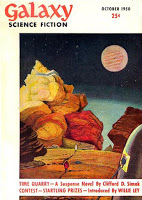 Guess what the Internet Archive has?
Guess what the Internet Archive has?Pdfs of great F/SF magazines of yesteryear. Dick, Knight, Asimov, Heinlein, Sturgeon, Matheson, Bradbury, Clarke, Bester...
Check it, droogs!
Published on June 21, 2017 17:32
June 16, 2017
The Dead Speak From the Mists of History - Primary Sources!
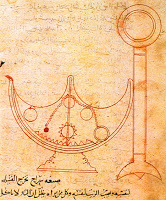 A self-trimming lamp!I'm getting tucked into Hero's Army, the sequel to The Wrong Sword. Among other things, HA deals with the Third Crusade. Here are some of the things I've researched:
A self-trimming lamp!I'm getting tucked into Hero's Army, the sequel to The Wrong Sword. Among other things, HA deals with the Third Crusade. Here are some of the things I've researched:The Banu Masu brothers and their Book of Tricks (a.k.a. Kitab al-Hiyal, a.k.a. The Book of Ingenious Devices)The Greek mathematician, engineer, and polymath Heron of AlexandriaKomnenid ByzantiumConrad of Montferrat, a.k.a. Conrad of Tyre, a.k.a. Conrad, King of JerusalemThe Hashashin sect of the Nizari Ismaili Shi'iMamluksThe khanjar blade vs. the sicaRichard I of England, a.k.a. Richard the Lionhearted, a.k.a. Prince Yes or NoAn-Nasir Salah ad-Din Yusuf ibn Ayyub, a.k.a. SaladinThe Ayyubid purge of the Fatimid book collections of Al-AzharMoshe ben-Maimon, a.k.a. Maimonides
 That's a sica
That's a sica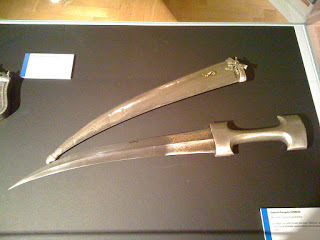 That's a khanjar
That's a khanjarI will probably do none of them justice, because you know...I'm a sloppy wiseass. That being said, I did uncover some interesting primary sources. What is a "primary source," you ask, as opposed to say, a secondary or even tertiary source?
A primary source is a document (or other informational artifact) from the time period you're studying - like, for instance, a letter from Queen Eleanor of England to Pope Alexander III. A secondary source is an analysis or distillation or retelling of primary sources, like a history textbook. As an author, I love primary sources. You are guaranteed to pick up details about how people thought, lived, and spoke that most historians neglect. Weird turns of phrase, odd biases, the tiny details that convey, if not fact, then verisimilitude.
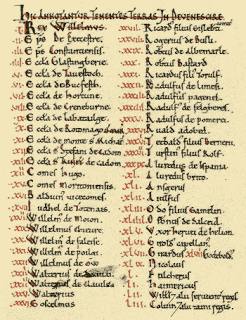 A page of the Domesday Book: Hic Annotantur Tenentes Terras in Devenescire...Turns out there are some neat primary sources on the Interwebz. Here are some of my current faves:The Internet History Sourcebooks Project: Letters and documents from dozens of different places and time periods. Translated, but otherwise unfiltered. My personal favorite? Liutprand of Cremona's Report of His Mission to ConstantinopleThe Travels of Benjamin of TudelaThe Book of Games of Alphonso X: Exactly what it sounds like. Descriptions of games they played in Alphonso's timeLe Viandier by Taillevent: A cookbook from 15th Century France.What Befell Sultan Yûsuf by Baha ad-Din ibn Shaddad: A chronicle of Saladin written by one of his close companions, and based on personal experienceMaimonides' Letter to YemenThe Domesday Book - If for nothing else, a terrific source of Anglo-Saxon names. Guthwalda, anyone?
A page of the Domesday Book: Hic Annotantur Tenentes Terras in Devenescire...Turns out there are some neat primary sources on the Interwebz. Here are some of my current faves:The Internet History Sourcebooks Project: Letters and documents from dozens of different places and time periods. Translated, but otherwise unfiltered. My personal favorite? Liutprand of Cremona's Report of His Mission to ConstantinopleThe Travels of Benjamin of TudelaThe Book of Games of Alphonso X: Exactly what it sounds like. Descriptions of games they played in Alphonso's timeLe Viandier by Taillevent: A cookbook from 15th Century France.What Befell Sultan Yûsuf by Baha ad-Din ibn Shaddad: A chronicle of Saladin written by one of his close companions, and based on personal experienceMaimonides' Letter to YemenThe Domesday Book - If for nothing else, a terrific source of Anglo-Saxon names. Guthwalda, anyone?
Published on June 16, 2017 17:42
June 12, 2017
So the Romans Were Gamers
Published on June 12, 2017 14:04
June 8, 2017
James Comey Actually Made a Plantagenet/Becket Reference!
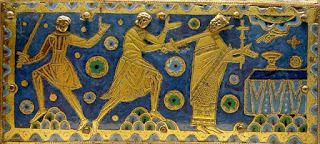 Becket gets a message from Henry"Will nobody rid me of this troublesome priest!?" screamed Henry II of England within earshot of four of his most eager minions - and that was all she wrote for Thomas Becket, Archbishop of Canterbury. Henry's hench-knights rode to Canterbury Cathedral and gave the soon-to-be-saint a case of terminal steel poisoning.
Becket gets a message from Henry"Will nobody rid me of this troublesome priest!?" screamed Henry II of England within earshot of four of his most eager minions - and that was all she wrote for Thomas Becket, Archbishop of Canterbury. Henry's hench-knights rode to Canterbury Cathedral and gave the soon-to-be-saint a case of terminal steel poisoning.And now James Comey brings it up to describe 45's Mafia-style weasel wording.
Color me impressed!
Published on June 08, 2017 19:42
May 24, 2017
A Dog of Woo-Hoo!
 I just sold my story, A Dog of Wu, to Fantasy & Science Fiction, the top speculative fiction magazine in the US. Let's all do our happy dance!
I just sold my story, A Dog of Wu, to Fantasy & Science Fiction, the top speculative fiction magazine in the US. Let's all do our happy dance!
Published on May 24, 2017 06:45
April 25, 2017
April 20, 2017
Your Tax Dollars at Work
 Aside from roads, bridges, and navies (and health care - wouldn't health care be nice?) you get stuff like this.
Aside from roads, bridges, and navies (and health care - wouldn't health care be nice?) you get stuff like this.Enjoy!
Published on April 20, 2017 09:15
April 15, 2017
Heinlein on Guns
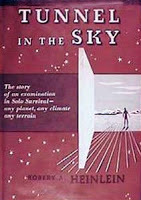 A lot of folks know Robert Heinlein as one of the Big Names of the Golden Age of Science Fiction - from the 1930s to the 1950s. Some folks know his later, creepier stuff. And every Randian Objectivist nerd knows him as the guy who articulated their anarcho-libertarian power fantasies better than they ever could, from TANSTAAFL ("there ain't no such thing as a free lunch") to his famous dictum on guns: An armed society is a polite society.
A lot of folks know Robert Heinlein as one of the Big Names of the Golden Age of Science Fiction - from the 1930s to the 1950s. Some folks know his later, creepier stuff. And every Randian Objectivist nerd knows him as the guy who articulated their anarcho-libertarian power fantasies better than they ever could, from TANSTAAFL ("there ain't no such thing as a free lunch") to his famous dictum on guns: An armed society is a polite society.
That's a quote from one of Heinlein's pulpier works, Beyond This Horizon, in 1942. It's gained enormous currency among gun enthusiasts since then, because it brilliantly encapsulates what might seem to be an obvious train of thought: People won't gratuitously insult, assault, or cheat someone who can kill them.
And that's too bad, for a couple of reasons.
First - and it's sad that I even have to say this - it's a bad idea in life to rely on the threat of death to make folks "respect" you. That's the behavior of punks and thugs, not the kind of people who actually do build "polite societies." There's ample evidence that armed societies are NOT polite. The opposite, in fact.
In American towns like Deadwood, Tombstone, and Dodge City - every man (and some women) went armed. Yet these were the towns that gave us the phrase "Wild West" and hundreds of Hollywood movies about gunfights. So...not exactly polite.
In 1999 in Mogadishu, the disintegrating capital of war-torn Somalia, the Red Cross estimated that the 1.3 million inhabitants owned more than a million guns. In fact, the number of civil wars across the African continent surged in the 1990s after the Cold War ended and vast stockpiles of small arms were made available to Africans at bargain prices on the international arms market.
Hell, right now, there are more handguns in America than there are citizens. Do you think we're a particularly polite society?
Second...Heinlein himself didn't necessarily believe his own epigram. He scattered thought experiments throughout his early work, and they dealt with political and social ideas as much as technological ones. Space Cadet, the first Heinlein YA I ever read, referenced Plato's notion of the Ideal State. Starship Trooper examined the nature of the right to vote. Coventry asked how a society devoted to the maximum freedom for each individual might punish an offender...and what that offense might be. And in Beyond This Horizon, the character who utters that famous maxim is a genetically superior member of a society that is based on two things absent from today's world: DNA enhancement..and dueling.
In short, Heinlein was making an argument. The last thing he would have wanted was to shut down the discussion. It was just his blessing (and his curse) that his writing voice was so convincing that even basic prose gelled into epigrams.
In 1955, more than a decade after Beyond This Horizon, Heinlein wrote Tunnel in the Sky. The protagonist is scheduled to go on an Outward Bound-type survival test on another planet. He asks his military-trained sister what equipment he should take:
"Uh, Sis, what sort of gun should I carry?"And that is the attitude I tried to maintain when I owned a gun. Worked, too.
"Huh? Why the deuce do you want a gun?"
"Why, for what I might run into, of course. Wild animals and things. Deacon Matson practically said that we could expect dangerous animals."
"I doubt if he advised you to carry a gun. From his reputation, Dr. Matson is a practical man. See here, infant, on this tour you are the rabbit, trying to escape the fox. You aren't the fox."
"What do you mean?"
"Your only purpose is to stay alive. Not to be brave, not to fight, not to dominate the wilds- but just stay breathing. One time in a hundred a gun might save your life; the other ninety-nine it will just tempt you into folly. Oh, no doubt Matson would take one, and I would, too. But we are salted; we know when not to use one. But consider this. That test area is going to be crawling with trigger-happy young squirts. If one shoots you, it won't matter that you have a gun, too- because you will be dead. But if you carry a gun, it makes you feel cocky; you won't take proper cover. If you don't have one, then you'll know that you are the rabbit. You'll be careful."
Published on April 15, 2017 14:22
March 8, 2017
For International Women's Day: The First Alchemist
 For my readers who are aficionados of the history of myth and magic:
For my readers who are aficionados of the history of myth and magic:Mary the Jewess, aka Mary the Prophetess, is considered the first true alchemist of the Western World. None of her writings survive, but her works, sayings, and inventions have been preserved in works by alchemists from al-Nadim to Zosimos.
Mary - probably Miriam, originally - lived sometime during the First to Third Centuries of the Common Era. Zosimos of Panopolis, a Fourth Century Gnostic Christian, is the first writer to mention her that we know of.
She was said to be able to make caput mortuum (a purple dye that was a big deal among alchemists) and to have invented several pieces of alchemical equipment, some of which are still in use today - the bain-marie double-boiler, for instance.
She also left us the following cryptic comments (everything the alchemists said was cryptic - go with it):
Join the male with the female, and you will find what is sought; andOne becomes Two, Two becomes Three, and out of the Third comes the One as the Fourth.
Published on March 08, 2017 10:31
February 2, 2017
Sic Transit Shepard Mundi
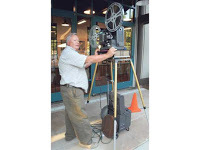 Dave Shephard, one of my instructors at USC, passed away recently. One of the good things about USC's film program was the instructors who were not only professionals, but enthusiasts: Tom Holman, who invented the THX sound system and genuinely loved everything audio. Bruce Block, who broke down visual composition in a way that actually made sense to non-graphics laymen. And Dave Shephard, THE film historian.To my knowledge, David had no advanced degrees, but he was responsible for saving a significant percentage of all the movies that had ever been shot on nitrate stock, transferring them to safety stock and then to video. I remember delivering a paper to him at his lab and getting a brief tour of the facility, from the safety locker to the liquid gate printer to a Steenbeck that had been used by Fellini. "Enthusiast" is the best word for him - a man who truly loved his work. He will be greatly missed.
Dave Shephard, one of my instructors at USC, passed away recently. One of the good things about USC's film program was the instructors who were not only professionals, but enthusiasts: Tom Holman, who invented the THX sound system and genuinely loved everything audio. Bruce Block, who broke down visual composition in a way that actually made sense to non-graphics laymen. And Dave Shephard, THE film historian.To my knowledge, David had no advanced degrees, but he was responsible for saving a significant percentage of all the movies that had ever been shot on nitrate stock, transferring them to safety stock and then to video. I remember delivering a paper to him at his lab and getting a brief tour of the facility, from the safety locker to the liquid gate printer to a Steenbeck that had been used by Fellini. "Enthusiast" is the best word for him - a man who truly loved his work. He will be greatly missed.
Published on February 02, 2017 11:29




